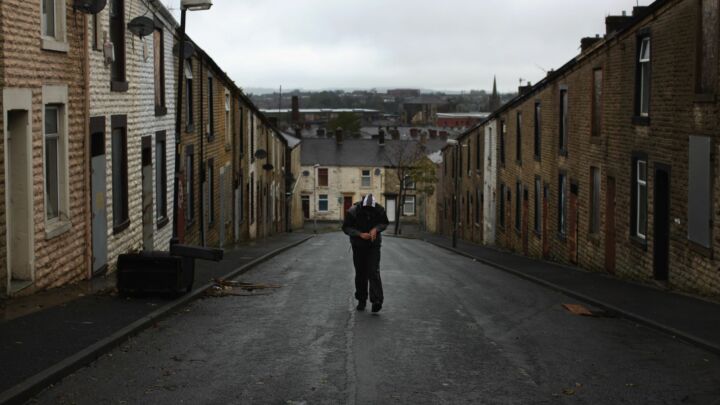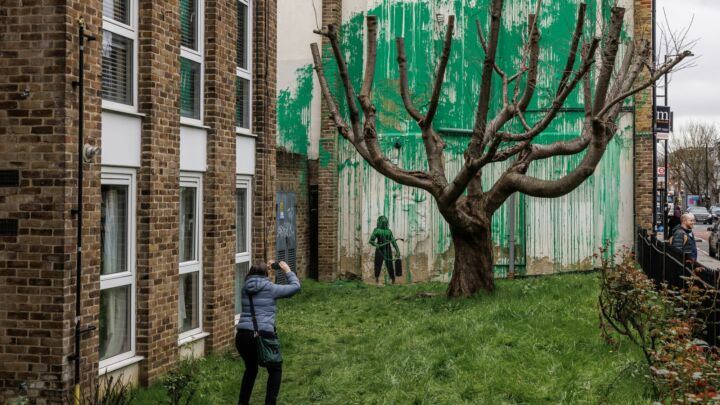Rwanda Safety Bill: is Britain a ‘safe country’ for democracy?
The elected Commons is being thwarted by an elitist alliance of lords, judges and UN bureaucrats.

The Tories’ plan to deport some asylum seekers to Rwanda might well be an ill-conceived, transparently useless attempt to look as if they are doing something about the migration crisis in the run-up to the General Election. But what’s far more dangerous is the attempt to wreck Rishi Sunak’s Rwanda scheme by an alliance of unelected establishment poohbahs and cronies: from the House of the Lords to the United Nations, from the UK Supreme Court to the Strasbourg judges of the European Court of Human Rights (ECHR).
The policies of an elected government should be judged by the electorate, at the ballot box. Not by unelected lords, bureaucrats and judges in their exclusive chambers, committee rooms and courts. So no, we can’t support Sunak’s Safety of Rwanda Bill as a solution to the problems in the English Channel. But we should back the government in its struggles over that planned law with the globalist elites. Because the debate might currently be framed around the question, ‘Is Rwanda a safe country for asylum seekers?’. But it raises a much more pressing issue – namely, is Britain a ‘safe country’ for democracy?
The oddly named Safety of Rwanda Bill is an attempt to circumvent establishment resistance. It follows last year’s Supreme Court verdict that it would be ‘unsafe’ for the government to deport migrants to the African state to have their asylum claims assessed, and similar blocking interventions by the ECHR.
In response, the bill would disapply large swathes of the Human Rights Act to deportation cases, give ministers the power to ignore so-called Rule 39 orders issued by the ECHR, and presumably enable the flights to Rwanda to take off.
Described as Sunak’s ‘flagship’ legislation in the run-up to the General Election, the bill was passed by MPs in the House of Commons last week by 320 votes to 276. After days of political wrangling over threatened rebellions and resignations, some 60 disaffected Tory MPs voted for amendments designed to make the bill tougher. In the end, just 11 Conservatives voted with the opposition against the bill. Yet almost immediately, prime minister Sunak felt obliged to warn unelected peers in the opposition-dominated House of Lords not to try to ‘frustrate the will of the people, as expressed by the elected [Commons]’ by seeking to scupper or delay the bill.
Whatever anybody thinks of Sunak’s bill, there can be little doubt that the will of the British people is overwhelmingly on the side of tougher restrictions on immigration. Every poll shows rising public anger about the smuggling of thousands of illegal migrants in small boats on to Britain’s south coast with apparent impunity. And the small-boats crisis is just the tip of the immigration iceberg. Net migration to the UK last year reached the extraordinary total of 672,000. The migration crisis now costs British taxpayers an estimated £3.6 billion a year – and rising.
Of course, the usual suspects will try to blame public anger over immigration on old-fashioned racism. In reality, the migration issue has become the focus for contemporary public concerns not only about resources and public services, but also about such basic principles of our society as democracy and free speech.
According to one former government pollster, discussing immigration now ‘almost blows the roof off focus group venues. It’s an issue that unites the country.’ As Tory support in the polls plummets, research shows that most of those who voted for Boris Johnson in 2019, but don’t plan to back Sunak next time, cited the failure to tackle immigration as the primary reason – a remarkable 75 per cent of Tory defectors in the south and 79 per cent in the north. Yet popular support for a crackdown on immigration means nothing to our out-of-touch elites. They have carried on undermining Britain’s national sovereignty and democracy in the sure and certain belief that they know better than, and what’s best for, the rest of us.
Tory rebels believe the Rwanda Bill still leaves the door too far open for legal appeals and judicial interference. For our globalist, border-hating elites, however, even Sunak’s proposals go much too far down the sovereigntist road. That high-level opposition is now focussed on the unelected House of Lords, staunch bastion of the forces of anti-democracy.
One anonymous Labour peer told Politico, house journal of Europe’s political establishment, why the Lords hates the immigration bill and is preparing for ‘trench warfare’ to stop it: ‘Not in the [Tories’ 2019] manifesto, attempting to overturn the Supreme Court, contrary to international law, contrary to human rights. All these things are likely to put lead in the Lords’ pencil.’
Of course, ‘all these things’ are of little or no concern to millions of voters who worry about what mass migration is doing to their communities and want their leaders to limit it, as they have repeatedly promised. But those vulgar masses are looked down upon with disdain by elites who see the silky liberal judges of the Supreme Court as morally superior to oikish MPs, and put ‘international law’ enforced by euro-judges above national laws passed by our elected representatives.
The unelected House of Lords has an anti-Tory majority that may well do its worst to delay and disrupt the bill, as it has done with previous immigration laws. We got an early taste of what’s to come this week, before the bill even arrives in the Lords, when peers voted by 214 to 171 to delay ratification of the UK’s new international treaty with Rwanda, which underpins the government’s proposed migrant deal. This was the first time the House of Lords had voted to delay ratification of a treaty, under a law that has been on the books since 2010.
The Lords’ resistance to the Rwanda scheme is being backed by the full force of the globalist elites. This week, Filippo Grandi, the UN high commissioner for refugees, denounced the government’s plans in an interview with the BBC (which is, naturally, leading the mainstream-media charge against the bill). If the government dares to pass such a law, the high-handed high commissioner declared, ‘because you want to keep people away from your borders, then this will always meet [the UN’s] disapproval’.
Meanwhile, Síofra O’Leary, president of the ECHR, warned that Britain would be breaking international law if it tried to deport asylum seekers and ignored the ECHR’s injunctions. The Guardian approvingly spelt out the message from the Strasbourg judges: ‘Rwanda flights: Britain reminded of obligation to obey ECHR orders.’
It should be clear now that this conflict throws even bigger political questions into sharp focus. In 2024, why should the appointed peers of the House of Lords have the power to block laws passed by elected MPs and thwart the will of the people? This is blatant anti-democratic meddling by the 800-odd peers that make up the biggest (and most unrepresentative) legislative assembly outside Communist China.
The elitist Lords had already shown their true (blue and yellow EU) colours by using all of their powers to try to dilute and even destroy Brexit, after 17.4million voted Leave in 2016. In a bizarre twist of history, they were cheered on by left-wingers who now have more in common with the peers than the populace. As the Labour bible, the New Statesman, put it during the battle over Brexit, the Lords is now ‘the left’s new best friend’. Never mind killing the bill, anybody with an ounce of democratic feeling should want to abolish the Lords.
And why should the judges of the UK Supreme Court or the ECHR in Strasbourg exercise power over our supposedly sovereign parliament, demanding that an elected government ‘obey’ their diktat? This is a baleful legacy of the Blair years, when New Labour passed the Human Rights Act (based on European law), and created the Supreme Court to enforce it. Despite big talk about changing the system, successive Tory governments have lacked the political will to take on the Human Rights Act and kick the ECHR out of UK affairs.
The Brexit revolt, the biggest vote for anything in British history, was about ‘taking back control’ of Britain’s laws and borders from unrepresentative elites, not only in Brussels but also in Whitehall and Westminster. Yet coming up to eight years later, the millions who voted Leave see far too little has changed.
Many are now willing to desert the Tories, who they blame for betraying Brexit. But how can Labour, led by arch-Remainer Keir Starmer, really be the party for them? Starmer’s ‘alternative’ to the Rwanda plan seems largely to amount to reducing illegal migration by making more of it legal. Reform UK, with Nigel Farage waiting in the wings, is rising in the polls as public anger over migration rises.
Leading pollster James Frayne believes things could go further. He says that, in 25 years of opinion research, ‘I cannot remember a more disillusioned and angrier electorate’, making Britain ‘ripe for a near-total replacement of the political class – with new parties, new candidates and new policies’. No wonder PM Sunak is so desperate to prove that he is more in tune with the people.
The ultimate unasked question behind the debate about migration and the Rwanda Bill is: who rules? That issue has sparked anti-establishment populist rebellions at the polls across Europe. It is now being posed in British politics as the next election looms into sight. Bring it on.
Mick Hume is a spiked columnist. The concise and abridged edition of his book, Trigger Warning: Is the Fear of Being Offensive Killing Free Speech?, is published by William Collins.
Picture by: Getty.
To enquire about republishing spiked’s content, a right to reply or to request a correction, please contact the managing editor, Viv Regan.







Comments
Want to join the conversation?
Only spiked supporters and patrons, who donate regularly to us, can comment on our articles.